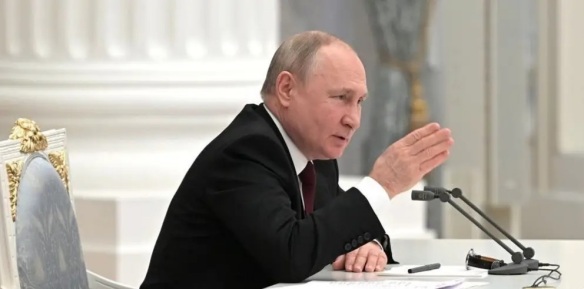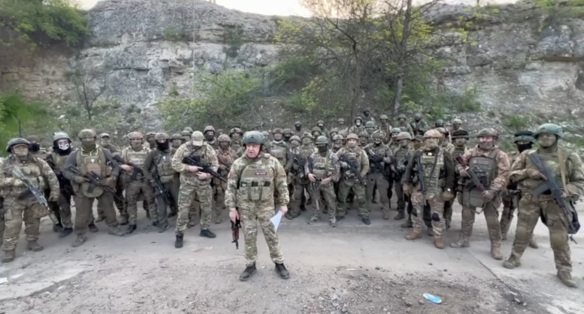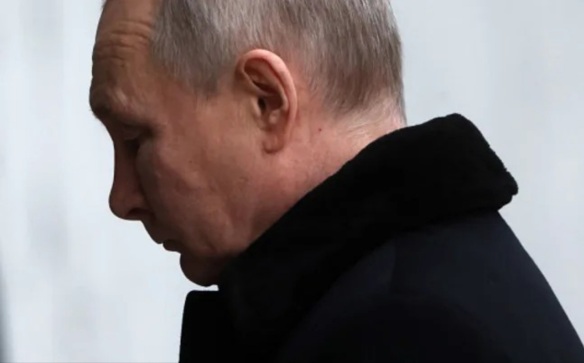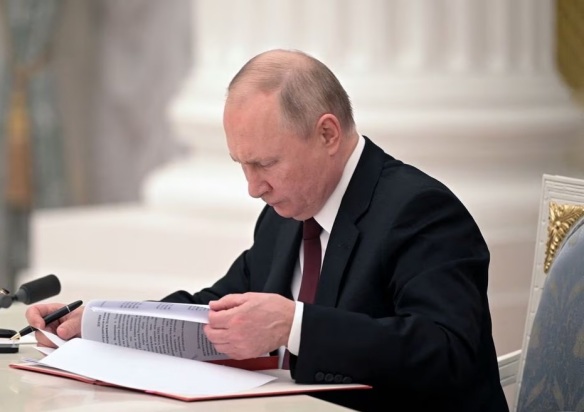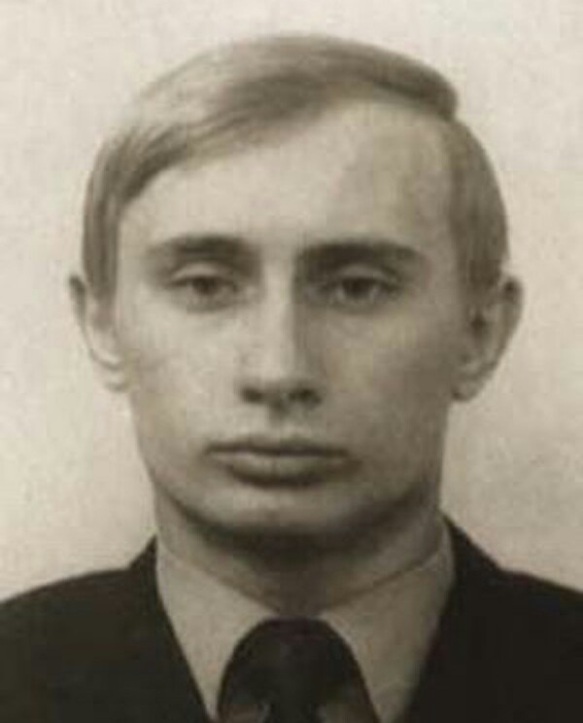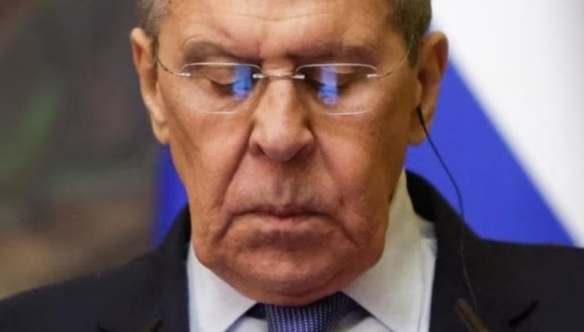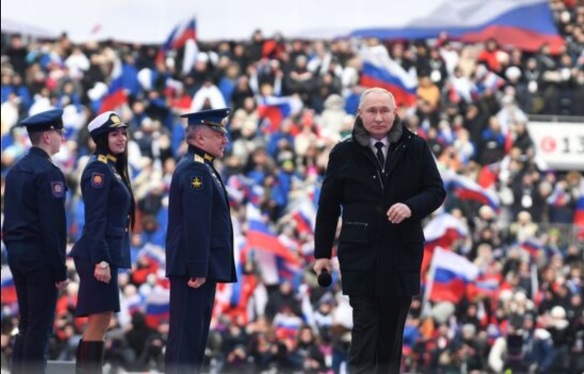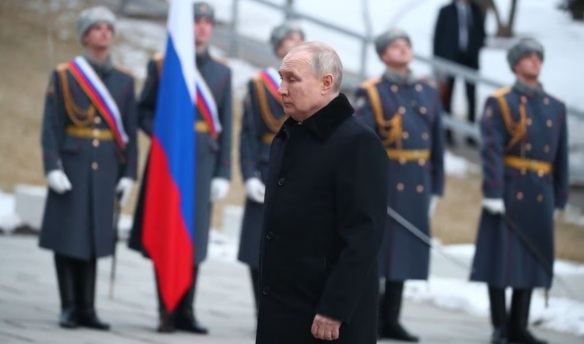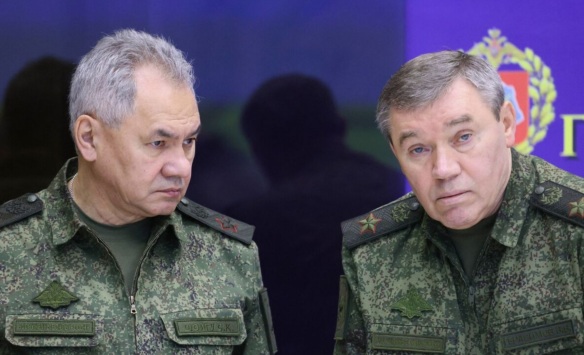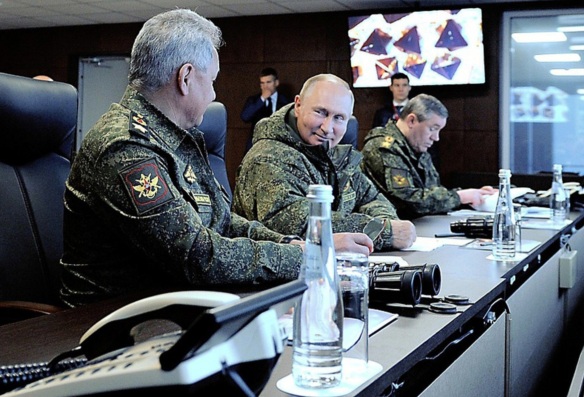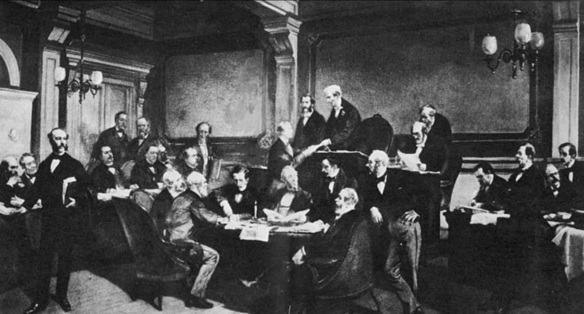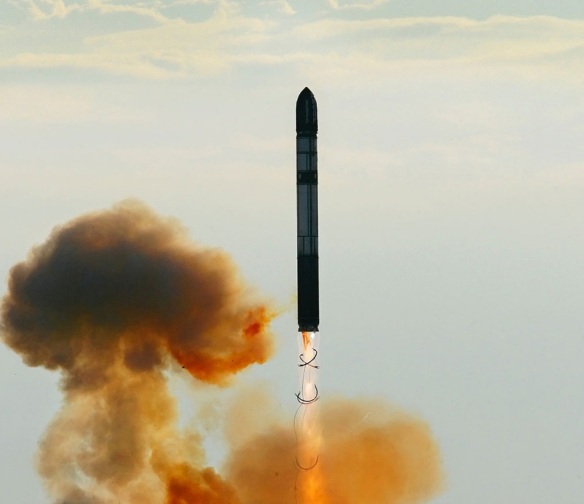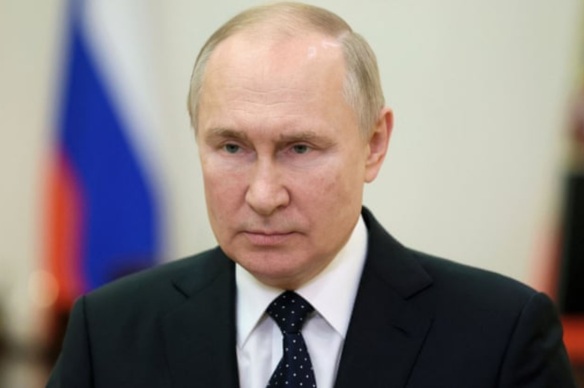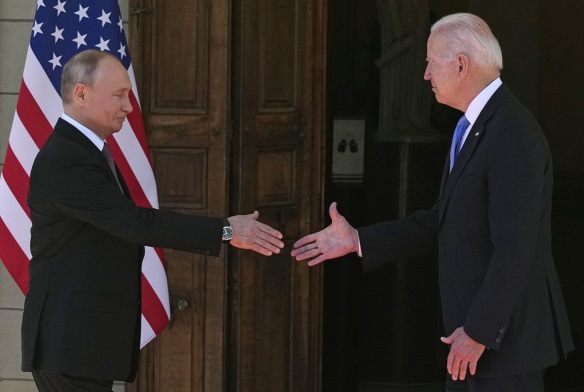Russian Federation President Vladimir Putin (center), takes a moment to gather himself while seated between Ministr Oborony Rossijskoj Federacii (Minister of Defense of the Russian Federation) General Sergei Shoigu (left) and Glavnokomanduyushchiy Voyenno-morskoy Flot Rossiyskoy Federatsii (Commander-in-Chief of the Russian Federation Naval Force or Russian Navy) Admiral Nikolai Yevmenov (right). The situation in Ukraine has hardly developed as expected by Russian Federation President Vladimir Putin’s way; in fact, things have gone terribly bad for him. Events may have had their impact upon his thinking. Putin, after all, is only human. To that extent, Putin should not be looked upon as the same individua he was at the start of the Spetsial’noy Voyennoy Operatsii (Special Military Operation). For instance, a lack of good solutions, options for action when trouble began was likely unexpected. He has surely learned to put far less faith in the words of advisers. He has likely turned to his own faculty and what may be the most reliable part of his intuition. It is possible that his ways of thinking on many matters, his willingness to try novel ideas that make sense, may have changed. Along that line, a reasonable change might be a decision to seek out advice from alternative sources at home that are outside of the Russian Federation foreign and national security policy bureaucracies for insights and options and could lead to an alteration in his thinking and approaches. That possibility is discussed here.
The situation in Ukraine has hardly developed as expected by Russian Federation President Vladimir Putin; in fact, things have gone terribly bad for him. Events may have even had a profound impact upon his thinking. Putin, after all, is only human. To that extent, Putin should not be looked upon as the same individual he was at the start of the Spetsial’noy Voyennoy Operatsii (Special Military Operation). For instance, when trouble began, a lack of good solutions, viable options for alternative actions, was likely unexpected. He has surely learned to put far less faith in the words of advisers. He has likely turned to his own faculty and what may be the most reliable part of his intuition to develop better answers. It is possible that his ways of thinking on many matters may have changed, and there might be a willingness, not to go off the rails, but to try novel ideas that make sense. Along that line, a reasonable change might be a decision to seek out advice from alternative sources at home that are outside of the Russian Federation foreign and national security policy bureaucracies to garner ideas, insights and options that could lead to an alteration in his thinking and approaches unexpected in Western capitals. That possibility is discussed here. In Western foreign and national security policy bureaucracies one might expect some well-accepted and well-used approaches to understanding Putin’s decisionmaking and rationalizing Russian Federation action based on what is known about its tactics, techniques, procedures and methods of doing things. Due to this, unexpected changes in his thinking might throw the West off-track to some degree, depending on what on-going approaches he hypothetically might change and how. The implications could be enormous. There remains a place for the bog standard analyses of Putin on some matters. However, with regard to Ukraine, it is essential to get beyond thinking along well-worn lines and the expected and consider all possible eventualities.
For a over a decade, some of officials of the US foreign and national security policy apparatus have made their intense dislike greatcharlie and disapproval of its plainly innocuous scribblings well known to it. Nevertheless, for others, greatcharlie hopes its efforts here are not value neutral, particularly with regard to students. Although greatcharlie would be satisfied enough to have this commentary stand alone as one of its many posts on foreign and national security policy, it would be humbled to see it take its place among ideas being exchanged internationally on Ukraine and Putin through which it may eventually become part of the greater policy debate. Malim equidem indisertam prudentiam quam stultitiam loquacem. (I should prefer ineloquent good sense to loquacious folly.)
A confident Putin (above) at the February 21, 2023 Security Council meeting regarding Ukraine. Although most would be willing to dutifully make the effort, surely among the Western political leaders and diplomats who have failed so far to get a handle on effectively negotiating with Putin, expectations for future fruitful talks would be far lower now than they were a year ago. Indeed, a year of frustration may have led many to close their minds to investigation of his thinking to find or construct inroads to him and rather settle on defining Putin with obloquy, viewing him as a prodigy of wickedness, a far less than advanced route taken long ago by many of their journalist counterparts. Facing such trying circumstances daily, Western leaders and diplomats might want to consider that there has likely been some transformation in Putin’s thinking with regard to his country’s prowess and its true image and place in the world since February 24, 2022. Putin has most likely been enlightened particularly with regard to the more or less substandard foreign and national security apparatus that he, if not blithely, surely fortuitously, was able to stake so much upon, while miraculously avoiding disaster, at least until now. His luck seemed to rest much on good use of the services of a shrewd and adept senior diplomat, Ministr inostrannykh del Rossiyskoy Federatsii (Foreign Minister of the Russian Federation) Sergei Lavrov. He has displayed a talent for being able to successfully promote his policies on just about everything,
A New Putin?: Transformed by His Circumstances
Although most would be willing to dutifully make the effort, surely among the Western political leaders and diplomats who have failed so far to get a handle on effectively negotiating with Putin. there would be far lower expectations of future fruitful talks now than they were a year ago. Indeed, a year of frustration may have led many to close their minds to investigation of his thinking to find or construct inroads to him and rather settle on defining Putin with obloquy, viewing him as a prodigy of wickedness, a far less than advanced route taken long ago by many of their journalist counterparts. They might find words from the play Henry the VIII. a collaborative effort between William Shakespeare and John Fletcher might find most apposite concerning him. In Act IV, scene iii, Katherine, Henry VIII’s ex-wife, reduced to princess dowager, converses to her attendants about the death of Cardinal Wolsey. Wolsey, a once trusted advisor to the king, having failed to secure an annulment of Henry VIII’s first marriage, was removed from government, arrested for treason, grew ill, and died a broken man. Katharine though saying she will speak of him with charity proceeds to characterize him in the following negative way, saying: “His own opinion was his law: i’ the presence / He would say untruths; and be ever double / Both in his words and meaning: he was never, / But where he meant to ruin, pitiful.”
Western leaders and diplomats might want to consider that there has likely been some transformation in Putin’s thinking with regard to his country’s prowess and its true image and place in the world since February 2022. He has most likely been enlightened particularly with regard to the more or less substandard foreign and national security apparatus that for, if not blithely, surely fortuitously, was able to stake so much upon, while miraculously avoiding disaster until now. His luck seemed to rest much on good use of the services of a shrewd and adept senior diplomat, Ministr inostrannykh del Rossiyskoy Federatsii (Foreign Minister of the Russian Federation) Sergei Lavrov. He has displayed a talent for being able to successfully promote his policies on just about everything,
It is very likely that even Putin as much as anyone else was surprised by the limited level of control he could exercise over his use of the Russian Federation Armed Forces especially once they were placed on the battlefield in great numbers. Indeed, events have been so far off from anything Putin most likely wanted or foresaw in Ukraine, that one could hardly believe genuinely that he ever had full control of the situation and reasonably make only an attenuated argument in support of that belief. The poor thinking of Russian Federation commanders and the positively horrible outcomes of their actions was most likely another eye-opener for Putin.
Periclum ex aliis facito tibi quod ex usu siet. (Draw from others the lesson that may profit yourself.) In its preceding post, greatcharlie stated that the Russian Federation would unlikely win the Ukraine War based on the record of performance of Russian Federation commanders to date. However, it must be explained further that the situation they face is not impossible to crack. Military commanders of other countries, such as the US for instance, would more than likely readily see the correct course of action to “breakout” of the Western and Southern fronts. One might hypothesize that a zealous emphasis on Russian military history in the course of studies in the 30 schools of Voyenny uchebno-nauchny tsentr Sukhoputnykh voysk “Obshchevoyskovaya ordenov Lenina i Oktyabr’skoy revolyutsii, Krasnoznamennaya, ordena Suvorova” (The Combined Academies Order of Lenin Order of the October Revolution Red Bannered Order of Suvorov of the Armed Forces of the Russian Federation-Military Educational and Scientific Center of the Russian Ground Forces), the equivalent of Western command and general staff schools and Voyennaya akademiya General’nogo shtaba Vooruzhennykh Sil Rossiyskoy Federatsii (The Military Academy of the General Staff of the Armed Forces of the Russian Federation), what suffices for Western war colleges, and an apparent failure to encourage student officers to examine in the round the strategy, tactics, and the operational art displayed by other countries armed forces in other wars, has left Russian Federation commanders without the slightest idea of how closely their current situation in Ukraine parallels that of a number of commanders in other larger conflicts of the past. Case studies of such done by student officers that would have familiarized them with those past foreign commanders’ successful combined arms actions that allowed them to maneuver their forces out of trouble and gain and retain the initiative would have likely changed the course of the current war.
Spectemur agendo. (Let us be judged by our acts.) Still, even if Russian Federation commanders hypothetically came upon an historical or novel way to storm through the frontlines of Zbrojni syly Ukrayiny (the Ukrainian Armed Forces) and put themselves in a position to do some “open field running,” it is hard to conceive of what would be their follow through to exploit success. Given their aberrant moves from the first day of the special military operation, it is difficult to imagine what for them would be priority objectives they would have in mind and why, whether they would intend to conquer all of Ukraine or limit themselves to securing certain useful territory. They surely would know by experience–disco inferno–or at least intimate that the Ukrainians would never tolerate any additional territorial gains in their country and in response to such a loss, build up stronger with the support of their allies, and strike back harder than ever before. Another rapid “dagger thrust” at Kyiv would be counterintuitive. One would expect Putin would have the most say in what to do next. Under this hypothetical situation, he would likely publicly or through classified orders, express his objectives for the next phase of the war, and from that, the concept and intent for the Russian Federation Armed Forces would be established.
Equally difficult to imagine in this hypothetical circumstance is what could potentially be planned under Putin’s concept and intent, given the likely remaining strength of units in contact with the Ukrainians, shortages in weapons systems, ammunition, other supplies, and authentic forecasts of future casualties and expenditures of military resources. All of that would likely preclude plans to do anything big. To that extent, it is hard to see even under the most favorable circumstances where this whole enterprise is going for Putin. (Discernibly, greatcharlie to a great degree here mimics the worst sort of strict (toxic) instructor. However, no lessons are being offered.)
Assuredly, Putin had influenced some decisions in the field such as the move against Kyiv early on in the invasion. In preceding posts, greatcharlie previously discussed what it felt was his likely role in that fiasco. However, Putin more than likely had no idea what in actual fact needed to be done to succeed, and worse, was completely unaware of how unprepared the Russian Federation Armed Forces were to successfully perform the mission he gave them. Likely believing everything else had been planned in a proper manner and prepared in the appropriate way, he doubtlessly could not have imagined that any “minimal input” from him on taking Kyiv could have so negatively shaped the entire picture of the operation.
To gnaw a bit further, if Putin had some idea of what the genuine situation in Ukraine was and had been aware of how unprepared the Russian Federation Armed Forces really were, he would very likely have realized there was a “strategy resources mismatch.” Possessing the ability to use an iron fist to compel his commanders to perform and even possessing a better than average level skill in the operational art, would not have had an impact on the outcome. It is greatcharlie’s contention that if Putin could have recognized right off all of the deficiencies, delinquencies, and. negligence of Russian Federation commanders and there is a chance that he would have acted rapidly to correct the situation before rolling his troops into Ukraine. Perchance Putin may not have gone into Ukraine at all if he had knowledge of all the realities.
Maybe Putin could have micromanaged the military if he had earnestly made the effort after becoming Russian Federation President to develop the acumen to act as a quasi strategist and tactician, at least at a level greater than Shoigu and at a proficiency somewhat better than Gerasimov. Perhaps he could have accomplished this in the model of the guerilla fighters, Mao Tse-tung or Ho Chi-Minh, or build on the military or paramilitary experiences that he had in government resemblant of US President Franklin Roosevelt, who, for seven years and throughout World Wat I, was an assistant secretary of the Navy, or United Kingdom Prime Minister Winston Churchill, who albeit he was a graduate of the Royal Military Academy Sandhurst, a decorated British Army officer, twice served as First Lord of the Admiralty. However, none of that happened for Putin. (Goodness, greatcharlie can only imagine what the backlash of some readers would have been if it had suggested there was some firm comparison of Roosevelt and Churchill with Putin. Á la Berezina!)
Although it is not discussed in this manner much in the newsmedia, it possibly could have been a terrible emotional blow for Putin to hear at this stage when he has circled the political wagons to better manage impressions at home as well as abroad concerning Ukraine to hear that an insider, his fidus Achates Prigozhin, was ready to take his Gruppa Vagnera (the Wagner Group) out of Ukraine. The Wagner Group, Putin’s ride or die–as the young people say–private military contractor, has always been there for him since 2012. As described briefly in greatcharlie’s May 15, 2023 post entitled, “Commentary: Ruminations on Putin’s Control of the Russian Federation Armed Forces, His Arrest Warrant, and Diplomacy with Moscow”, the Wagner Group is a private military contractor based in the Russian Federation. Although private military companies are not permitted under law in the Russian Federation, they were endorsed in April 2012 by none other than Putin, then Russian Federation Prime Minister, during an address to the State Duma. The Wagner Group is owned by Yevgeny Prigozhin is an intriguing figure in his own right, and holds a level of standing with Putin which speaks volumes on its own. Prigozhin is widely known by the sobriquet “Putin’s chef” because of his catering businesses that hosted dinners which Putin attended with foreign dignitaries. The Wagner Group has engaged in action externally in support of the Russian Federation’s overt and covert foreign and national security objectives. The Wagner Group is known to have deployed its units in the War in Donbas (2014–2022); Syrian Civil War, (2015–2016); the South Sudanese Civil War (2013-2020); the Central African Republic Civil War (2013-2014); the Second Libyan Civil War (2014-2020); the Sudanese Revolution (2018-2019); Venezuelan presidential crisis (2019-2023); and the Mali War (2012-present). Prigozhin expressed a desire to leave Ukraine not due to disloyalty or defeatism, but due to the attitudes and actions of the same Russian Federation Armed Forces senior commanders whose Forces it jumped into Ukraine to support–or as Prigozhin would say, “rescue.” Wagner Group units were not receiving the military resources they needed to fight in a manner they preferred.
A screenshot from a video published on May 5, 2023 depicting Wagner Group owner Yevgeny Prigozhin (above) announcing the organization’s planned exit from the fierce struggle in Bakhmut, Ukraine. Although it has not been parsed in the round in the international newsmedia, it surely must have been an emotional blow for Putin to hear at this stage when has circled the political wagons to better manage impressions at home as well as abroad concerning Ukraine that Gruppa Vagnera (the Wagner Group) was ready to leave Ukraine. The Wagner Group–Putin’s “ride or die”, as the young people say–private military contractor, has always been there for him since 2012. The organization expressed a desire to leave Ukraine not due to disloyalty or defeatism, but due to the attitudes and actions of the same Russian Federation Armed Forces senior commanders whose Forces it jumped into Ukraine to support–or as Prigozhin would surely say, “rescue.” Wagner Group units were not receiving the military resources they needed to fight in a manner they preferred.
Where Is the Good Advice?
Important to note is the actuality that despite an awareness of the monumental hardships an individual may be facing, often the presumption from the outside is that everything is fine because of the individual’s poker face or what could be characterized as his “trauma smile” does its job of hiding what is going inside.. Satisfied with appearances, few would investigate further into the matter with vigor, especially if what might result from that exploration would not “harmonize” with recognized perceptions of said individual at high-levels of management. Perhaps that is the accepted nature of human behavior in 2023. For a deeper dive, one would only need to consider in real terms what the inner conversation must be for the individual in question. In its October 30, 2022 post entitled “Brief Meditations on the Selection of Surovikin as Russia’s Overall Commander in Ukraine, His Capabilities, and Possibilities for His Success”, greatcharlie took a look at what Putin’s inner conversation might have been at the time examining an historical example from Antiquity. (Usually, the potency of works from Antiquity is immediately apparent.) In Book VII, Chapter 234, section 1-3 of The Histories, Herotodus of Halicarnassus (c. 484 B.C. – c. 425 B.C.), the renowned Greek historian of the Hellenic period reconstructs a hypothetical conversation between the Persian King Xerxes, and his general and uncle, Demaratus.
Herotodus writes: “Xerxes then sent for Demaratus and questioned him, saying first, “Demaratus you are a good man. I hold that proven by the plain truth, for things have turned out no differently than you foretold. Now, tell me this: how many Lacedaemonians are left, and how many of them are warriors like these? or is it so with them all?” “My king,” said Demaratus, “the number of the Lacedaemonians is great, and so too the number of their cities. But what you would like to know, I will tell you: there is in Lacedaemon a city called Sparta, a city of about eight thousand men, all of them equal to those who have fought here; the rest of the Lacedaemonians are not equal to these, yet they are valiant men.” “And how, Demaratus,” answered Xerxes, “can we overcome those men with the least trouble to ourselves?” Come, disclose that to me, for you have been their king and know the plan and order of their counsels.” This passage of The Histories underscores the reality that even in a past age when leaders were viewed as something just short of gods, or actually as gods, there was the recognition that no matter how wise, there were things they could not know, things they could not control.
The Ukraine matter cannot be easily remedied. Putin watched his predecessors mismanage, breakdown, and lose control over the Soviet Union while he was both inside and outside the system. Despite his best efforts, he was unable to repair the Russian Federation by replicating a stronger, greater version of the Soviet Union as he seems to have hoped. To be fair, he has produced, at least within the borders of the Russian Federation, a reasonable facsimile of what came before it. In the extreme, one might suggest he may have already decided to figuratively burn down the whole tattered simulacrum of what came before. The course of the invasion of Ukraine, the result of which he was certain of, may have left less doubt, if any, on the correctness of this hypothetical hope of his.
True, Putin could choose to stumble forward against all the odds and eke-out whatever existence life presents after the Ukraine War at great personal loss for himself and the Russian Federation. However, that appears unlikely. If the records can serve as evidence, he will likely continue on the reckless and destructive path upon which he set his country on February 24, 2022. That may mean triggering the most undesirable statistical probability his predecessors foresaw the most likely outcome: a perpetuation of the struggle long-term would be between East and West–that began during the Cold War between the US and the erstwhile Soviet Union, the death of which he mourned with considerable grief.
Putin (above) attends the Collective Security Treaty Organization Leaders Meeting in Yerevan, Armenia on November 23, 2022. If Putin had some idea of what the genuine situation in Ukraine was and had been aware of how unprepared the Russian Federation Armed Forces really were, he would very likely have realized there was a “strategy resources mismatch.” Possessing the ability to use an iron fist to compel his commanders to perform and even possessing a better than average level skill in the operational art, would not have had an impact on the outcome. It is greatcharlie’s contention that if Putin could have fully recognized right off all of the deficiencies, delinquencies, and. negligence of Russian Federation commanders and there is a chance that he would have acted rapidly to correct the situation before rolling his troops into Ukraine. Perchance Putin may not have gone into Ukraine at all if he had knowledge of all the realities.
Unlike the aforementioned Xerxes of Persia, for Putin there is no uncle and general as Demaratus, to put him in the full, genuine picture of what he faces and authentic possibilities for action. Perhaps even more, someone to stimulate genius. Holding its focus upon the Ancient World, greatcharlie is unaware of any equivalents of the Ephors of Sparta to whom Putin can turn. An Ephor (Overseer) discussed in intermittently–yet too often to properly cite here–in the Hellenica (c. 362 BC) by the Ancient Greek military leader, philosopher, and historian, Xenophon of Athens (c. 430 BC–354 BC), was a member of a board of five magistrates in Sparta, annually elected by the body of eligible voting citizens. They were experienced and wise individuals whose advice was worth a king’s ransom. Ephors had an extensive range of judicial, religious, legislative, and military powers, and could shape Sparta’s domestic and foreign affairs. Their primary responsibility, however, was to oversee the actions of Spartan kings. They could critique a ruler’s plans for war,use their extra powers to reel in a ruler, and reproach them for the unsound actions. This had greater necessity and meaning due to the fact that Sparta was ruled by two hereditary kings of the Agiad and Eurypontid families, both supposedly descendants of Heracles and equal in authority, so that one could not act against the power and political enactments of his colleague. In concept, the Ephors’ purpose was akin to that of a US Congressional Oversight Committee, mutatis mutandis, for executives of foreign and national security bureaucracies who must often face withering inquiries on their policy plans or ongoing initiatives, among many other issues. In greatcharlie’s May 15. 2023 post entitled “Commentary: Ruminations on Putin’s Control of the Russian Federation Armed Forces, His Arrest Warrant, and Diplomacy with Moscow”, it was briefly mentioned that the US Congress established the War Powers Act of 1973 in the wake of the Vietnam War to gain a better handle on the ability of the US President to intervene with the armed forces. In the Congress, stronger action toward chief executives whose actions were deemed out of bounds by the majority of Representatives has included impeachment proceedings. (Recognizably, Congress unfortunately in more recent times has overreached on simple matters as simple as phone calls preferring to react upon impressions, presumptions, and political and public pressure, than actualities. Perhaps it could be chalked up to human nature, human fallibility.)
The situations presented in the two examples from past and present noted here are quite different from that of Putin. In accord with the Constitution of the Russian Federation, the President is elected directly by popular vote, is head of state, and chief of a multi-party system. Executive power is exercised by the government, headed by the Prime Minister, who is appointed by the President with a legislature’s approval. Legislative power is vested in the two houses of the Federal Assembly of the Russian Federation, the Federation Council, an upper house of appointed representatives from each of Russia’s administrative divisions, and the State Duma, a 450-member popularly elected lower house. Still, it is the President’s office and the government ministries which issue numerous legally binding by-laws.
All of this being stated, the common wisdom is that Putin is an autocrat who holds near limitless power under the system he created. On foreign and national security policy, he faces no obstructions concerning his decisionmaking on diplomacy and war. Putin has no need to end-run the Federal Assembly, no need to heed advice as precious as that of the Ephors from Senators of the Federal Council of Representatives of the State Duma. He runs the whole show. Managing the internal affairs of the Russian Federation on its own is a colossal task, and surely as a one man show, Putin has made his share of mistakes and is bound to make more mistakes into future. He is not a deity; as aforementioned, he is only human. Taking on not only Ukraine militarily but the wherewithal of nearly every Western country and others, without relinquishing on scintilla of responsibility for normal duties, there would be the likelihood that he would drop an almighty clanger. Perhaps the Ukraine venture could best be described as a blunder of a lifetime.
Beneath the Surface
Alios ego vidi ventos, alias prospexi animo procellas. (I have seen other winds and faced other storms.) Putin may secretly worry that good answers may never be found, not even mere acceptable ones to his problems regarding Ukraine. As already hinted, everything he has, his hopes, his future, the future he has planned for his country, are under the real threat of dissolution. His imagination would not be at work overtime on these points. Indeed, such thoughts may be unfixed, moving about freely in his mind, perhaps billowing up at inconvenient moments. Among ordinary individuals, such thoughts can break through the strongest defense the mind can raise against them. Putin is not outwardly despondent, although there have been public moments when he was not exactly his usual self.
Surely, it would be one thing if Putin had brought disaster and suffering upon himself alone by his actions. That would pain him, but he would almost certainly be able to carry it well. Casualty lists from Ukraine are likely far more difficult for him to carry. Unless one has faced similar circumstances, one might safely say it is hard to imagine–surely impossible for greatcharlie to imagine–how it all must feel. Perhaps the situation would be made far worse if the Russian people had decided to light on him over the war’s progress, but that has not happened.
In a poll of Russian Federation citizens on the direct question of whether they supported the war conducted by the independent and well-known research group in the country, the Levada Center, it was found that respondents who said yes fluctuated between 74 and 76 percent in April 2022 and August 2022, declined to about 71 to 74 percent in September 2022 and December 2022, and climbed back to around 75 percent to 77 percent in January 2023 and February 2023. The Levada Center utilizes face-to-face polling. In a poll on support for the war conducted by The Chronicle, a one year-old polling group, it was found that support rose in the first months of the war from 59 to 66 percent. Support then declined to 51 percent, its lowest point, at the end of September 2022. Yet, by February 2023, support rose upward again to 59 percent. The Chronicle conducted its polling by telephone. The Chronicle also offered respondents the option “I do not want to answer” in addition to the usual “undecided” option, which reduced the share of both war supporters and war opponents. The recent polling start-up, The Russian Field, conducted a survey which indicated support for the war rose to nearly 60 percent at its start and then stabilized at about 66–68 percent. The Russian Field also used the telephone survey method.
Clearly, support for the war is nowhere near overwhelming, yet given its progress it still appears rather high. Any external effort to create the impression that there is no support for the war among Russian Federation citizens or an effort to stir sentiment against Putin would most likely fall flat. There is likely no greater priority for Borrnikov than to make certain that is the case. While considering Putin’s effort to get a hold of his thinking on all that has transpired and what he must do next, the lyrics of singer-songwriter James Taylor’s 1970 hit “Fire and Rain” were brought to mind. The apposite lines are: “Been walking my mind to an easy time / My back turned towards the sun / Lord knows, when the cold wind blows / It’ll turn your head around / Well, there’s hours of time on the telephone line / To talk about things to come / Sweet dreams and flying machines in pieces on the ground.”
A somber Putin (above) attending a wreath-laying ceremony at the eternal flame in the Hall of Military Glory at the Battle of Stalingrad Museum, Volgograd, February 2, 2023. Important to note is the actuality that despite an awareness of the monumental hardships an individual has been facing, it is often the presumption from the outside that everything is fine because of the individual’s poker face or what could be characterized as his trauma smile does its job of hiding what is going inside them. Satisfied with appearances, few would invest much more into the matter. Perhaps that is the accepted nature of human behavior in 2023. The Ukraine matter cannot be easily remedied. Putin watched his predecessors mismanage, breakdown, and lose control over the Soviet Union while he was both inside and outside of the system. Despite his best efforts, he was unable to repair the Russian Federation by replicating a stronger, greater version of the Soviet Union as he seems to have hoped. To be fair, he has produced, at least within the borders of the Russian Federation, a reasonable facsimile of what came before it. In the extreme, one might suggest he may have already decided to figuratively burn down the whole tattered simulacrum of what came before.
Throwing a Curveball at the West
As briefly mentioned earlier, a firm understanding of how foreign and national security bureaucracies within the Russian Federation “think” on issues as well as information collected via exquisite surveillance technologies of Western intelligence services, has given the Kremlin’s Western “opponents” a leg up on what is likely being recommended in situations whether heeded by the Kremlin or not. At the same time, individuals as Putin can often have unique reasons for singular choices. In a possible scenario, the paucity of good, useful answers and insights emanating from the Russian Federation foreign and national security bureaucracies might cause him to consider soliciting thinking from outside of them. Such may be the state of Putin’s anxiety over this grave matter that he might seek an unorthodox path to power out of the huge mess he is ultimately responsible for. Application of an inventive line of thinking, if of real value, might throw an intriguing but nevertheless distressing curveball at the West.
If only out of academic interest, greatcharlie considers how seeking answers from outside the Russian Federation foreign and national security policy bureaucracies could potentially be useful to Putin, and what the potential outcome of quietly taking such an unexpected course might assist in fostering new ideas and approaches in the Kremlin. No matter how unorthodox, disagreeable, or round the bend as they might seem, it might behoove some managers in US foreign and national security policy bureaucracies to consider it and other possible, albeit recherché, eventualities and apply them in analyzing Putin’s decisionmaking process. Doing so might serve to improve the chances at accurately predicting any “unexpected” moves. (In previous posts concerning the conundrum of the very successful and unhindered Chinese intelligence operations within the US, greatcharlie benignly made the suggestion that US foreign and national security policy bureaucracies make use of those capable of performing analyses of the situation from outside the box.)
Over the years of Putin’s leadership, a small number of organizations in the Russian Federation have been invited to share their views through studies and presentations with the government on foreign and national security policy issues. At the top of the heap are: the Council on Foreign and Defense Policy, the Valdai Discussion Club, the Russian International Affairs Council, and the Russian Institute for Strategic Studies. Given their size, political contacts, and financial means, these organizations are able to dominate the think tank scene in the Russian Federation. As aptly put by the Atlantic Council in a November 12, 2019 report, they represent albeit from different ideological angles, the rather volatile mainstream. If novel ideas and insights are being developed those organizations, it would seem they are being put forward at glacial speed. Indeed, the indications and implications of what Moscow continues to do are that nothing Putin has received so far from what might suffice for “outside the bureaucracies advice” has had the power to moved events forward Moscow’s way in a manner befitting a power of the size, strength, and prominence in the world–at least from Putin’s lens.
Putin signing documents, including a decree recognizing two Russian-backed breakaway regions in eastern Ukraine as independent entities, during a ceremony in Moscow, Russia, February 21, 2022. As briefly mentioned earlier, a firm understanding of how foreign and national security bureaucracies within the Russian Federation “think” on issues as well as information collected via exquisite surveillance technologies of Western intelligence services, has given their Western “opponents” a leg up on what is likely being recommended in situations whether heeded by the Kremlin or not. In a possible scenario, the paucity of good, useful answers and insights emanating from the Russian Federation foreign and national security bureaucracies might lead Putin to consider soliciting thinking from outside of them. Such may be Putin’s anxiety over this grave matter that he might seek an unorthodox path to power out of the huge mess he is ultimately responsible for. Application of an inventive line of thinking, if of real value, might throw an intriguing, but nevertheless distressing, curveball at the West.
As aforementioned, greatcharlie, without pretension, states that it doubts anyone at the Kremlin is aware of, or would have the slightest interest in, its scribblings. However, there is very likely a need at this point to remind some readers that greatcharlie does not seek to offer anything that might in the slightest way support or provide advice for Putin concerning the prosecution of the Russian Federation’s intervention in Ukraine. If any readers feel that anything as such is being offered to Putin, then it would surely be unreasonable for them in particular to continue reviewing this commentary with such colored perspective. Again, the purpose of this commentary is to suggest to any Western foreign and national security policymakers and decisionmakers ways to take a broader view on Putin’s decisionmaking regarding the Ukraine issue to create opportunities for fruitful diplomacy with the Russian Federation leader despite the challenging circumstances that exist presently.
A reality about analytical departments of foreign and national security bureaucracies worldwide is that certain dogma insinuates itself in work produced within them, and it can color the thinking of consumers of that product. Supervisors in the analytical departments, knowingly and occasionally unknowingly because it would only be human, may place limitations on what paths, albeit even reasonable and logical ones, that analyses can move along. By using perspectives from outside of the foreign and national security bureaucracies, one could possibly garner a fresh look at issues from other angles. New thinking might rejuvenate the analytical process, effectively serving to unearth directions and areas for examination and offer hypotheses, good ones, that otherwise would be ignored. In effect, surface layers could be peeled off to reveal what may have been missed for a long time. Condescendingly, some from the inside Russian Federation foreign and national security policy bureaucracies might characterize observations and hypotheses offered by outside of the bureaucracies thinkers as mere shots in the dark, guesswork, and suppositions, from those perceived as lacking the necessary depth of understanding that long time analysts bring to the Ukraine issue. With no intent to offend, one might assess responses of that type would be defensive and emotional, and least likely learned.
One looking for fresh, viable solutions would expect and perhaps want “outside of the bureaucracies” thinking to move away from the usual track, the derivative, the predictable, especially in singular cases such as Ukraine that may be hard to crack. What the outside of the bureaucracies thinker brings to the analysis of an issue, through the examination of people and events and interpretation of data, is the application of different sensibilities founded on knowledge acquired after having passed through a multitude experiences that might very well have thwarted the recruitment of the outside of the foreign and national security policy bureaucracies thinker. One might suppose the length and breadth of the outside of the bureaucracies thinkers’ distinctive knowledge and unique life lessons are what found their alternative understanding of humanity. Such an understanding also could have been acquired through personal study. Of course, bog-standard thinking would still have its place in other simpler issues.
Each reason shared here concerning a hypothetical decision by Putin to seek assistance for ideas and insights outside of the foreign and national security policy bureaucracies is suggestive of itself. Together they have a cumulative force. At the same time, one could also conjure more than one reason to doubt this outcome. As mentioned, Putin has not as yet taken any unorthodox approaches in his handling of the Ukraine matter or any other foreign or national security policy matters. Some observers might argue that there are distinct patterns in his decisionmaking. Deviations from his standard course would be as shockingly noticeable, to steal a phrase from one of Arthur Conan Doyle’s 56 Sherlock Holmes short stories, “The Adventure of the Bruce-Partington Plans” (1917): “as if you met a tram-car coming down a country lane.” (One could easily imagine seeing such in a film created by Austrian director Marie Kreutzer.) To double-dunk on Doyle’s work, one might say that Putin has his rails and he runs on them, so to speak. However, perhaps one disappointment after another in Ukraine may not have derailed him, but may have stirred some interest in possibly switching at the points to an alternative rail untravelled by him before. What is being considered here is not just Putin’s attitudes and behaviors in spite of his experiences with Ukraine, but the possibility of some alterations in such because of those experiences. To that extent, one might also argue that the record of his two decades of leadership in the Russian Federation actually shows that Putin’s mind has its quirks, and in that respect it is as individual and curious as any other. As Maurice de Saxe (October 28, 1696-November 20, 1750) the famed military commander of the 18th century stated in the preface of his Mes Rêveries (My Reveries) (1757), “routine and prejudices are . . . a natural consequence of ignorance.”
At a time of national emergency, which the Ukraine War represents for the Russian Federation, its citizens may likely feel compelled to step forward to support their homeland. Since work as a foreign and national security policy analyst of a kind ostensibly would not include being shot at, it would seem safe enough for some to volunteer to serve. Yet, with all of that being stated, one must remain conscious of the fact that in the Russian Federation, individuals can face very difficult circumstances following even the innocuous contact with the federal government. This reality is at great variance with the general experience of individuals living in Western democracies after contact with respective governments. (Of course, in some cases, Western governments, too, can find limitless ways to betray the expectations, faith, and trust of their citizens. On this point, greatcharlie writes from experience.)
To that extent, perhaps scholars and analysts outside of the foreign and national security policy bureaucracies would not be quick to provide any reports or interviews. There might be a morbid fear among many scholars and analysts outside of those organizations to offer insights and options in such a hypothetical situation believing it is possible that the failure to bring forth favorable outcomes, even if their concepts were obviously misunderstood or misapplied might only antagonize those who they earnestly sought to assist. There would be reason to fear they would be held accountable for the result and some severe punishment would be leveled against them.
Punishment might especially be a concern if Putin himself were to take direct interest in their efforts. If he were somehow personally disappointed by how information received negatively impacted an outcome, there would be good reason for those who supplied that information to worry. Many outside of the foreign and national security policy bureaucracies might feel that the whole issue of Ukraine is such an emotionally charged issue among Putin and his advisers that, perchance, nothing offered would likely be deemed satisfactory. In the end, it would be enough of a tragedy to find themselves and those close to them under the radar of hostile individuals with whom anyone living in relative peace would loathe to be in contact. Given all the imaginable pitfalls, based stories of the experiences of others, in this hypothetical situation, those who might have something of real value to contribute may decide or their respective families and friends might insist it would be far better and safer not to get involved.
File photo of Putin as a young KGB officer (above). At an early age, Putin revealed to his parents that he wanted to work in the security services. The genesis of the idea were books and spy movies. Putin says his mother and father, with the help of his martial arts coaches, tried to dissuade him from his career choice given the nature of the work and people within such organizations, but to no avail. A few years later, his dream became a reality. Perhaps today scholars and analysts outside of the foreign and national security policy bureaucracies would not be quick to provide any reports or interviews. There might be a morbid fear among many scholars and analysts outside those organizations to offer insights and options in such a hypothetical situation believing its possible that the failure to bring forth favorable outcomes, even if their concepts were obviously misunderstood or misapplied might only antagonize those who they earnestly sought to assist. There would be reason to fear they would be held accountable for the result and some severe punishment would be leveled against them. Given all the imaginable pitfalls, based stories of the experiences of others, in this hypothetical situation, those who might have something of real value to contribute may decide or their respective families and friends might insist, that it would be far better and safer not to get involved.
In Part 2, of his biography/memoir First Person: An Astonishingly Frank Self-Portrait by Russia’s President (Public Affairs, 2000), Putin explains that at an early age, he wanted to serve in intelligence. His family was dismayed, but not shattered by his decision. His father, given his experience in the Narodnyi Komissariat Vnutrennikh Del (People’s Commissariat of Internal Affairs) or NKVD, was painfully aware of the grave nature of work in that field. However, once they became fully apprised of the extreme nature of his ambition to join the intelligence service, his parents sought to discourage him as best they could. When Putin’s martial arts coach, Anatoly Rakhlin, who he fondly called “Semyonovich”, went to see them to say that as an athlete, their son could get into an Institute practically without passing exams, that led his parents to pressure the coach to encourage him to go into an Institute. Putin, however, disagreed with the idea. Semyonovich could not fathom why Putin resisted. Another coach from Putin’s martial arts club, Leonid Ionovich, came to visit, fully informed of his decision to join the intelligence service. As Putin explained it, “He was a clever guy.” Recounting the exchange with Ionovich over his career choice, Putin said the following: “‘Well,’ he [Ionovich] said to me, ‘Where are you going?’ Of course he already knew. He was just acting sly. I said, ‘To university.’ ‘Oh, that’s great, good for you,’ he said. In what department?'” Putin says he only replied, “The law school.” Then, Ionovich roared: “What? To catch people? What are you doing? You’ll be a cop. Do you understand?” Insulted, Putin yelled back, “I’m not going to be a cop.” (In its March 31, 2017 post entitled, “Book Review: Vladimir Putin, First Person: An Astonishingly Frank Self-Portrait by Russia’s President (Public Affairs, 2000)”, greatcharlie provides a review of Putin’s memoir/biography.) Putin would hardly be surprised if very few who truly had much to offer would come forward knowing they were hearing similar things about serving his government that those who cared deeply about him said concerning his interest in getting anywhere near the Soviet intelligence service
Quomodo in perpetua pace salvi et liberi esse poterimus? (How (in what way) will we be able to be safe and free in everlasting (an enduring) peace?) Returning to the idea of seeking answers from analysts and scholars from outside of the foreign and national security policy bureaucracies, on the face of it, surely it would be unwise for Putin not to avail himself of their services if they could be of assistance. Additionally mentioned in Book 2, Chapter 4, Section 31, Book 3, Chapter 4, Section 11, and Book 4, Chapter 5, Section 6 of Xenophon’s Hellenica are the embassies. (The role of the embassies is also discussed in Herodotus (c. 484-c. 425 BC) The Histories (c. 426 BCE-c. 415 BCE) in Book 5, Chapter 49-51 and in Thucydides (c. 460 BC–400 BC) The History of the Peloponnesian War (c. 430 BC) Book 2, Chapter 12, Section I and Book 8, Chapter 5, Section I.)
As noted earlier, Putin has formidable diplomatic capability which resides in Lavrov. Perhaps the Ministerstvo inostrannykh del Rossiyskoy Federatsii (Russian Federation Ministry of Foreign Affairs) with the assistance of some outside of the bureaucracies thinking, might be able to give birth to something far greater than a mouse and as solid as Stonehenge. In Lavrov’s organization under this hypothetical, ideas and insights provided by analysts and scholars from outside of the foreign and national security policy bureaucracies would hardly serve to compete with or replace existing analyses within the organization. They would likely serve as a much needed supplement, a burst of energy and breath of fresh air in the effort to find the best solutions with the ultimate aim of promoting the Kremlin’s goals.
Under Lavrov’s direction, one might expect veteran analysts within his ministry would be tasked with adding conceptual rigor and clarity to the work of the outsiders without discernibly altering it or weakening it. That effort would surely improve the validity and utility of what is produced from this novel approach. Lavrov, himself, would be the best judge of the quality and acceptability of what is developed and determine whether any product should be advanced to the prime consumer in the Kremlin’s Senate Building.
Again, this is all hypothetical. It is possible that defeating any hypothetical outside of the foreign and national security policy bureaucracies approaches potentially taken by Moscow would only require the energetic preparation for such a possibility by repeatedly considering and working through all of the “what-ifs”, the possible eventualities, on an appropriate schedule.
Russian Federation Minister of Foreign Affairs Sergei Lavrov (above). As noted earlier, Putin has formidable diplomatic capability which resides in Lavrov. Perhaps the Ministerstvo inostrannykh del Rossiyskoy Federatsii (Russian Federation Ministry of Foreign Affairs) with the assistance of some outside of the bureaucracy thinking, might be able to give birth to something far greater than mouse and as solid as Stonehenge, that may help resolve the Ukraine conundrum. In Lavrov’s organization under this hypothetical, insights provided by analysts and scholars from outside of the foreign and national security policy bureaucracies would hardly serve to compete with or replace existing analyses within the organization. They would likely serve as a much needed supplement, a burst of energy and breath of fresh air in the effort to find the best solutions with the ultimate aim of promoting the Kremlin’s goals. Under Lavrov’s direction, one might expect veteran analysts within his ministry would be tasked with adding conceptual rigor and clarity to the work of the outsiders without discernibly altering it or weakening it. That effort would surely improve the validity and utility of what is produced from this novel approach. Lavrov, himself, would be the best judge of the quality and acceptability of what is developed and determine whether any product should be advanced to the prime consumer in the Kremlin’s Senate Building.
The Way Forward
It remains to be seen what will come next. In Act II, scene iii of William Shakespeare’s play, All’s Well That Ends Well (1623), standing in the King’s Palace, Lafeu, an old lord at the court of France, opens the scene with the comment regard the king’s miraculous recovery: “They say miracles are past; and we have our / philosophical persons, to make modern and familiar, / things supernatural and causeless. Hence is it that / we make trifles of terrors, ensconcing ourselves / into seeming knowledge, when we should submit / ourselves to an unknown fear.” While greatcharlie has not come across a cogent argument proving that events in Ukraine represent something supernatural or that one should submit to fears of the unknown, there is pertinence in the statement that trifles should not be made of terrors, especially as they regard nuclear war or that feel assured at all about Putin’s next moves.
What stands near certain is whatever measurable degree of peace and security existed before the invasion of Ukraine will unlikely be restored. Each side in this conflict seems bent upon ensuring the other will not find satisfaction with any agreement that would obviate complete victory. An authentic forecast for the situation could only project a situation worse than before or the worst thing imaginable. When things are very wrong, one must remember they can always be worse. One only needs to imagine the possibilities. At least, there is a clear choice for both sides: take an albeit uncomfortable step toward peace; or, let things play out as they are moving now. Neque porro quisquam est, qui dolorem ipsum, quia dolor sit, amet, consectetur, adipisci velit, sed quit non numquam eius modi tempora incidunt, ut labore et dolore magnam aliquam quaerat voluptatem. (There is no one who loves pain itself, who seeks it and wants to have it, simply because it is pain, but because sometimes circumstances arise in such a way that with effort and pain they can obtain some great pleasure.)


